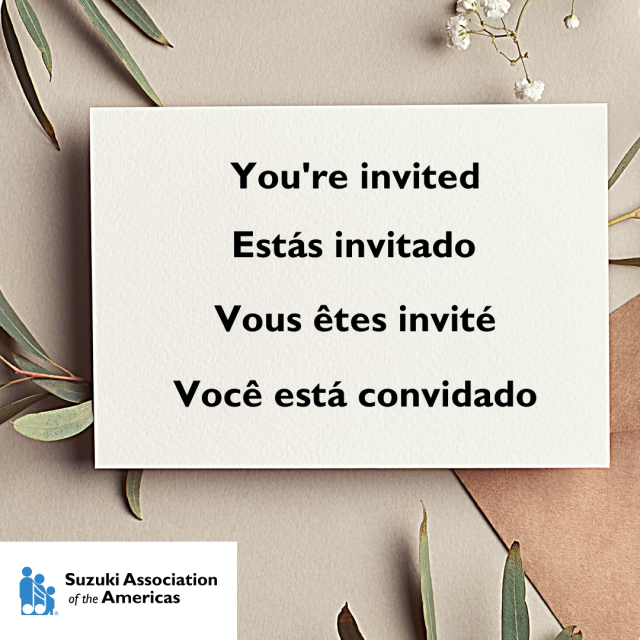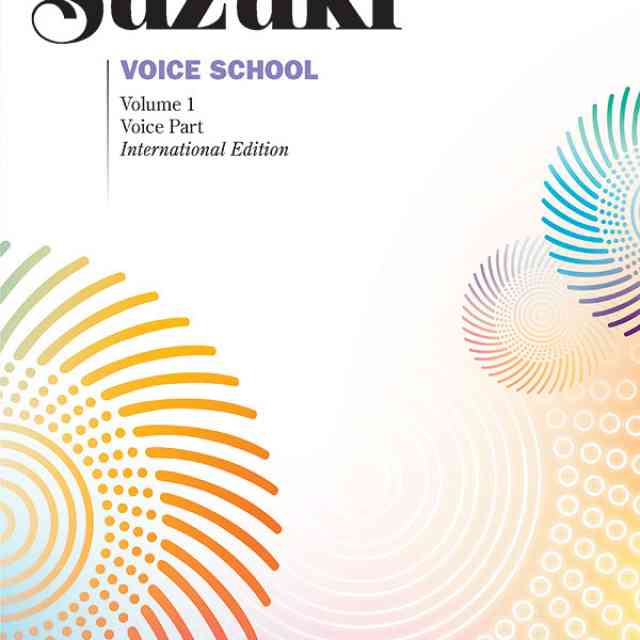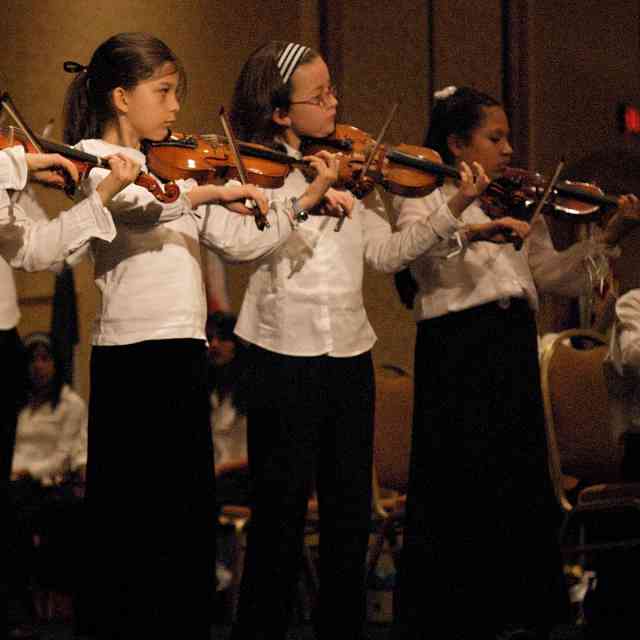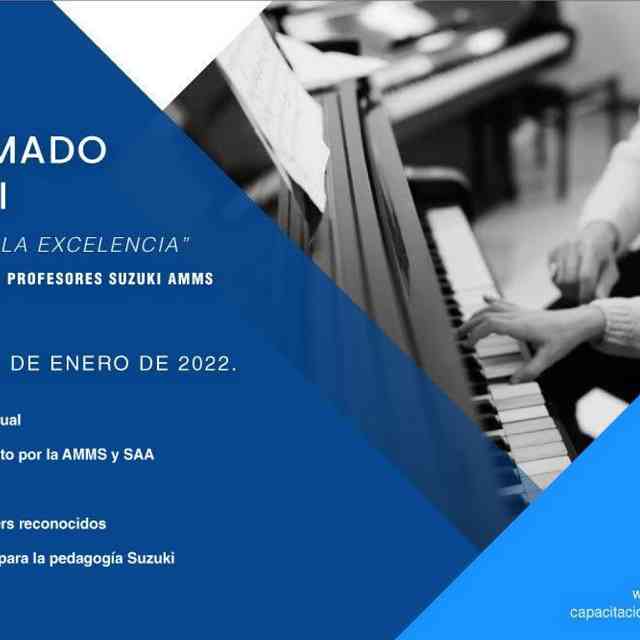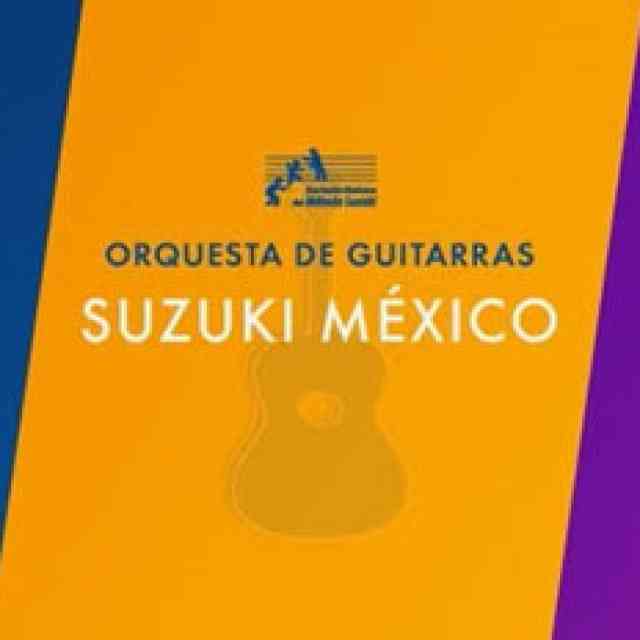Step by step, many hands and hearts that believed the Suzuki Method was for everyone gave generously of their time and knowledge to spread the Suzuki philosophy throughout the Americas. Latin American countries have a long history of Suzuki teachings. Dr. Shinichi Suzuki himself traveled with the ISA tour group to several of our countries in the 1970s, and the late John Kendall gave many workshops in Latin America. With great vision, William Starr insisted on naming our association the Suzuki Association of the Americas in plural, thus creating an international organization that brought together Latin America, Canada, and the United States.
Suzuki programs started around 55 years ago with a very successful trajectory. Suzuki students have joined national symphony orchestras and become Suzuki teachers and Teacher Trainers. What follows are insights into the Suzuki Method’s spread in Latin America, written by some of the crucial teachers who helped the movement reach more students, teachers, and countries.
Suzuki schools and programs continue to grow and flourish. In Mexico, for instance, Suzuki pedagogy is included as a core subject in the music degree at the Universidad Panamericana, directed by Dr. Gabriel Pliego.
Dr. Gabriel Pliego, doctor in musicology, violin teacher, and ex-president of the Mexican Suzuki Association (AMMS), writes:
The SAA closely guided the beginning of the Mexican Association of the Suzuki Method, which helped shorten the learning curve. Our physical proximity to the U.S. has allowed a successful exchange of teachers in both directions. This exchange is one of the reasons why we have been able to spread the Suzuki Method across various areas of music education: private studios, academies, music schools, social assistance programs, and even university programs, like the one that exists at the Universidad Panamericana in Mexico City.
But, more than physical closeness, there has been an even more critical closeness with the SAA: the closeness of friendship, which has allowed us to grow in a very human environment of learning, respect, and support. The SAA is not just an educational community; it is, above all, a community of friends centered around Dr. Suzuki’s philosophy.
Fernando Piñero, violin Teacher Trainer, Córdoba, Argentina, writes:
In 1967, Dolores Oliva Soaje de Bermann “Loló” started a Suzuki Program in Cordoba, Argentina, which continues to this day. Eduardo Ludueña and I graduated from that program and became some of the first violin Teacher Trainers in Latin America.
Rafael Montero Castro began the first Suzuki project in Puerto Rico in 1968, where the program continues to grow and flourish.
Maria Wilfried started the first program in Brazil in 1974. Teacher Trainer Shinobu Saito wrote her doctoral thesis on the beginnings of the Suzuki Method in Brazil.
Many Suzuki students continued on to become teachers and professional musicians in the 1980s. John Kendall’s books, “Listen and Play,” were critical resources. He gave a workshop in 1986 in Curitiba, Brazil, that brought together teachers from Brazil and Argentina. The workshop initiated systematic teacher training, which flourished with the festivals in Chile and Peru during the 1980s and grew exponentially with festivals in other countries. The Suzuki movement has continued to thrive ever since through teacher exchanges from the whole continent.
Caroline Fraser and Marilyn O´Boyle began teacher-training courses in the 1980s in Peru and Chile and then expanded their teachings throughout Latin America. Marilyn has recently retired, and Caroline continues her quest to spread Dr. Suzuki’s philosophy throughout Latin America, demonstrating that Dr. Suzuki´s principles transform lives and entire communities.
Peru hosted the first SAA international teacher training festival in 1983. Since then, Latin America has hosted 36 more annual festivals attracting participants of diverse instruments from all over the Americas.
Many SAA Teacher Trainers gave generously and tirelessly of their time and expertise to travel from the U.S. and Canada year after year to train teachers during the annual Peru International Festivals. Thanks to their dedication, inspiration, and mentoring, there are now 13 Latin American Teacher Trainers in piano, violin, cello, guitar, and recorder.
Marilyn O’Boyle, violin Teacher Trainer, Albuquerque, New Mexico, writes:
During the 1980s, I lived and taught in Lima, Peru, for two years, and Santiago, Chile, for three years. It was challenging and rewarding to be one of the first Teacher Trainers in those countries. I continued teaching and training teachers at festivals there and in 9 other Latin American countries for over 30 years. I had great adventures and have wonderful friends there!
Latin America is made up of diverse and separate countries, which vary in culture, diet, and language. Even though Spanish and Portuguese are the official languages, I remember arriving in Chile after two years in Peru and finding that I could not understand much of what was being spoken! I have deep respect for each country’s unique qualities and gifts. What unites all of them is what unites us all: a desire to nurture all children well and to make a better world for everyone.
Roberta Centurión, piano teacher and first president of the Suzuki Association of Peru (ASP), writes:
I became enamored with the Suzuki philosophy in the early 1980s in Lima, Peru, when I first met Caroline Fraser. Caroline and Marilyn O´Boyle were my first teachers and mentors, and my sons’ teachers. Thanks to the training and the financial aid I received to attend the biannual conferences, leadership retreats, and world conferences, I developed a new vision of what could be achieved through Talent Education. I am grateful for those SAA members who opened their hearts and homes, provided transportation, raised funds, and donated instruments and music for our programs. I am so appreciative of the Teacher Trainers who came to Peru to share their knowledge and love of music with our teachers and families. I hope that the SAA will continue supporting new leaders and listening to their ideas. May the SAA be the force to bring Talent Education to all children in the Americas.
Annika Helasvuo, cello teacher and ex-president of the ASP, writes:
I have had the privilege of including the Suzuki philosophy in my life for the past 40 years. In the beginning, I was just trying with disbelief, but the philosophy´s principles always attracted me.
Reflecting upon my years of experience, I would like to highlight the value of the vitality and constant innovation that my immense team of marvelous colleagues has shown. In the same way that each individual’s potential is enormous, the potential of a community has no limits. This continues to be one of my most important experiences in the Suzuki philosophy, and I hope to be able to transmit it to everyone I meet.
In her Suzuki Association of Peru document, “Milestones” Roberta Centurión wrote:
The First Latin American Teachers’ Encuentro took place in Lima, Peru, in 1999. This Teacher’s Conference was held in conjunction with the 14th Festival. During two intensive days of sessions and panel presentations, 67 Suzuki teachers from across the Americas studied, discussed, and laid the foundations to unify the efforts of teachers and programs throughout Latin America. Lively discussions and presentations in English, Portuguese, and Spanish addressed such topics as leadership, philosophy, Suzuki Early Childhood Education, teacher training, organizing institutes, fundraising, and networking to strengthen communications among members and make connections with publishers to obtain books and teaching materials. Enthusiasm abounded, friendships were made, and priorities were set. This historic event surpassed all of our expectations and led to the continuing growth and strengthening of the Suzuki movement in Latin America.
The first Latin American Teachers’ Conference was followed by six more events held in Lima every three years until 2017. We dreamt of forming a Latin American Suzuki Students Orchestra one day, and in 2010, that dream became a reality. Latin-American students’ encuentros were held in Lima in 2010, 2012, and 2015. Working together brought the countries closer, with teachers and students celebrating each country’s traditional music, learning about the different cultures, and experiencing extraordinary teamwork. The orchestra included, in addition to the string instruments: guitar, recorder, choir, and piano and used special musical arrangements to accommodate different skill levels, allowing as many students as possible to participate.
Latin-American students’ ensembles participated in two SAA Conferences in Minneapolis with joyful and colorful performances celebrating the music and cultures of our region.
Fernando Piñero writes:
The SAA brought together the first Latin American Suzuki Ensemble that played at the Conference in Minneapolis in May 2008. About 40 children from eight countries performed again in 2014, made up of strings and folkloric instruments, and mainly Latin American repertoire. The performance had a great impact on the movement in Latin America and on the teachers from the U.S. and Canada, who could experience both the diversity of the different countries and the same ideal from one hemisphere to the other.
When I had met William Starr many years before, he looked at me and told me, “get music from your country.” Seven years later, in that concert, I felt, “Here we are, Maestro, doing what you asked us to do. This is a musical approach from our region.”
We started to forge a network of colleagues and friends throughout the festivals, the ensembles, and the encuentros. Together, we built a vision for the future. This network became our support during the pandemic. But these are not just virtual connections. They are real, beyond the distance.
Lorena Mayra Leal Isida brought SECE Teacher Trainers to Monterrey, Mexico, to give SECE courses for the first time in Latin America in 2016. SECE is now in the process of being adapted to both Spanish and Portuguese for use in Latin American countries. Since 1996, Maria Luisa Labarthe and Roxana del Barco have offered enrichment courses for classroom and preschool teachers in Early Childhood Music based on the Suzuki philosophy in Peru and throughout Latin America.
The First Suzuki Convention of the Americas, directed by Leslie Mizrahi, took place in Cancun, Mexico, in May 2019.
Leslie Mizrahi, piano teacher and ex-president of AMMS, writes:
Teachers, families, and students gathered from 27 countries, from the Americas and Europe, Australia, and Asia. New collaborations and friendships were born, united through the language of music and the Suzuki spirit. The convention was a great example of connectivity, created by the shared ideals of the Suzuki philosophy. Love and music overcame all borders.
The convention combined daily international keynote speakers, outstanding diverse teacher’s talks, and a professional gala concert. There were two student orchestras made up of Suzuki students aged eight to 20 playing string instruments, including harp, guitars, recorders, and pianos. There was also a choir of 230 students—their lively voices warming our hearts as a long-time dream of unity was fulfilled. Group lessons of every instrument in every level were featured in a play in called “Suzukiada,” and pianists had individual lessons and a final recital as well. At the end, we all celebrated a great Mexican Fiesta!
The convention was an example of international collaboration, as we brought together a team of over 100 volunteers working towards making this first convention a great success. There were one thousand participants! It was an enriching, inspiring, and life-changing experience for everyone, where new friendships were born and new ideas and collaboration were created between teachers.
Thanks to extensive research by Renata Jordão, we can report that there are now Suzuki programs in 20 Latin American and Caribbean countries: Argentina, Belize, Bolivia, Brazil, Chile, Colombia, Costa Rica, Cuba, Dominican Republic, Ecuador, El Salvador, Guatemala, Honduras, Mexico, Nicaragua, Panamá, Paraguay, Peru, Puerto Rico, and Uruguay.
Renata Jordão, violin teacher from Petrópolis, Brazil, writes:
My primary motivation for starting this research was to look into the expansion of Dr. Suzuki’s method in Latin America. This research focused on finding out how many countries used the method, how many associations there were, the number of training courses offered, and the number of Suzuki students and Teacher Trainers. The numbers were extraordinary, no doubt. However, the deeper I delved in, the more amazed I became at how profoundly Dr. Suzuki’s philosophy can get inside the hearts of human beings.
While interviewing people, I could feel and confirm values, virtues, and love motivating their acts and decisions. Moreover, I could see Dr. Suzuki’s philosophy impacting their lives as a whole, mirroring the inside of the music classroom. They overcame incredible challenges, never losing their purpose of building a better world. It is impossible to share the dimension of all that in just a few words, but here are some amazing examples:
A few teachers took the philosophy to their country and shared their knowledge even without instruments, as there were neither pianos available nor the conditions to bring them. Children started learning by drawing a keyboard on a table and began their music path by imagining the sound, training finger technique and strength. Much more than music skills were awakened in all of them as they learned to find their inner voices. They discovered that music lives inside them, whether they have an instrument or not. Other teachers traveled from very far away, crossing mountains and facing difficult conditions to get to a Suzuki training course so that they could acquire knowledge and values to take back to their villages and share with others. It may sound like an epic tale or a romantic film, but these are real people, living real lives, overcoming challenges, and turning them into inspiring acts.
Another very special teacher developed a wonderful Suzuki program in a foreign country, which even included an orchestra for parents. After some years, she returned to her birth country and left behind a solid foundation for a music program, which is now very famous and successful. Arriving home, she restarted running her music community with the same love and conviction. She was able to sow as many seeds as needed wherever she went. From the beginning, their vision was not only nurturing their surroundings with love and respect, but also sharing and spreading it all over. This was a challenging task in those days, without having the internet and the communication tools it brings. Their network was built with open hearts, and with very little they reached very far. There are still more places to reach, more people to be helped, and more beautiful hearts to be touched. Following this path, our generation is strongly encouraged to keep growing and expanding Dr. Suzuki’s vision and dream with as much love as he taught us. If we are united, we can get further. We can achieve more, and we can change the world.
Throughout the years, country associations developed to bring teachers closer, keep a learning community active, grow together, and keep families inspired and students motivated through activities such as national conferences, festivals, teachers’ meetings, and specific instrument gatherings.
Since the COVID-19 pandemic, many of these events were offered online, and new possibilities such as practice challenges, online concerts, summer camps, and webinars have helped keep the community connected. Online training has helped make training possible for more teachers due to being less costly and time-consuming. The amount of training has increased enormously, with teachers anxious to continue their training and also retake the earlier units. The Latin American Teacher Trainers offer courses and teach at festivals year-round.
Caroline Fraser, piano Teacher Trainer and ex-president of the ASP, writes:
As I reflect upon the current Latin American Suzuki family, I wonder, could this thriving community have been created had the events of the past 50 years taken place exclusively online?
This community full of life-long friendships, with new and upcoming leaders working and planning a different future together, has been formed over the past 50 years during encuentros, festivals, and SAA retreats and conferences. All these were in-person events until the pandemic closed many doors of opportunity while opening others. The community expanded beyond teachers and students as teams worked together behind the scenes to make travel possible; funds were raised, priorities defined, and passports acquired at times against all odds. Bonds were formed in the classroom and nurtured outside the classroom. Together we planned, drank wine, laughed, and talked about the profound and the frivolous.
Online training and organizational meetings greatly facilitate working and learning together across country borders, reaching remote and economically challenged areas, and enhancing our global community beyond measure. In-person events importantly bring peoples’ souls together. Latin America has greatly benefitted from a tradition of international events, where a common vision unites participants from a variety of cultures and geographical realities: to shape a better world of peace, respect, and understanding.
We are grateful to the SAA, which has played a vital role in the growth of the Suzuki Method in Latin America by consistently supporting Suzuki festivals and working together with country associations to empower teachers and families through the Suzuki philosophy. The Suzuki Method has penetrated different economic and cultural realities, thanks to flexibility within the SAA structure, focusing on maintaining quality and excellence while bringing the principles and values of the Suzuki philosophy to a more diverse population.
In 2021, two critical committees were created: The Latin-American Teacher Trainers’ Committee and the Latin American Country Associations’ Committee. We thank them for their great effort and constant collaboration.
Latin American Teacher Trainers’ Committee: from Argentina: Andrea Espinzo y Patricia Pasmanter cello; Diana Chagalj, guitar; Eduardo Ludueña and Fernando Piñero, violin; from Brazil: Fabio Dos Santos and Shinobu Saito, violin; Renata Pereira, recorder; from Chile: Blancamaria Montecinos, piano; from México: Joaquin Olivares, guitar; Miguel Angel Aguirre Medrano, piano; from Perú: Caroline Fraser and Flor de Maria Canelo, piano.
Latin American Country Associations´ Committee: Araceli Hackbarth, Fabio Dos Santos and Luciana Castillo, Brazil; Andrea Raza, Ecuador; Mariana del Rosario Rodríguez Alcantara and Rubidia Lilubina Boror Bor, Guatemala; Araceli Lugo Oliva and Leslie Mizrahi, Mexico; Caroline Fraser, Peru/Scotland; Flor de Maria Canelo and Sabino Blancas, Peru
Although we are from many different countries and cultures, our collaboration has created a close friendship that has erased borders. In the future, we hope to grow and expand the movement in both quantity and quality. We recognize the different cultures in Latin America while spreading the values and principles of the Suzuki philosophy: educating with love and sowing the seeds of mutual understanding, compassion, and respect—working together to create a better world for all.

